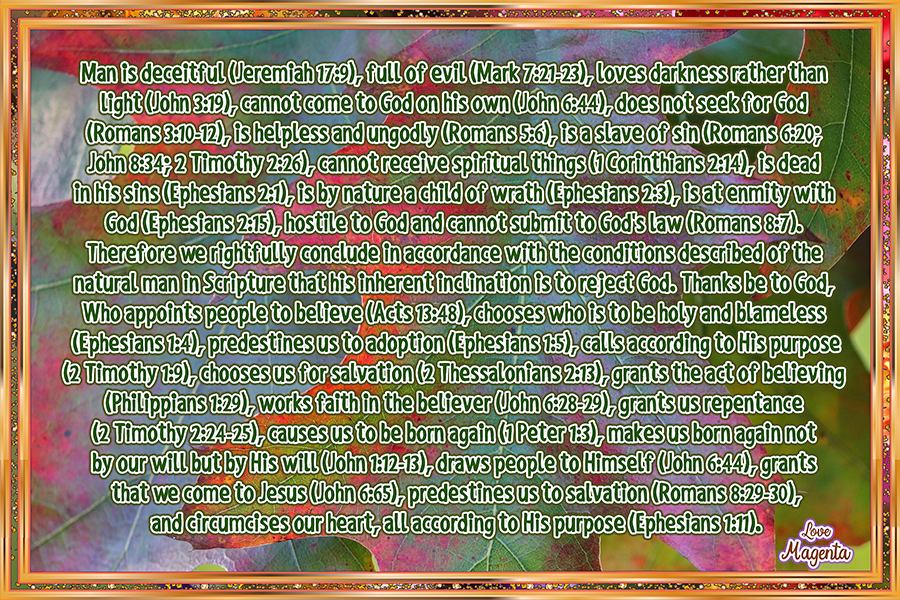The Things Fools Hate and the Wise Love
1. In addition to fools despising Wisdom (Prov 1:7), which is the flip side to the Knowledge coin, they also
hate Knowledge itself and
love their simple ways (Prov 1:22).
2. And because fools
hate Knowledge they have no desire to freely choose the Fear the Lord (Prov 1:29).
3. The Wise and Discerning, however, turn their ear to Knowledge (Prov 18:15), apply their
heart to Understanding to understand the Fear of the Lord and find the Knowledge of God because, unlike fools, they take pleasure in such Wisdom (Prov 18:2), so they accept Solomon's wise words and store up his commands with them, understanding it is the Lord who gives Wisdom and from his mouth come Knowledge and Understanding (Prov 2:1-6); but fools do not acquire Wisdom since they have no desire for it (Prov 17:16).
4. The way to shun and
hate evil is to Fear the Lord (Prov 3:7; 8:13); yet, the fool
cannot hate evil and shun it because he has no desire to choose the Fear of the Lord (Prov 1:29).
5. I (Wisdom personified)
love those who love me and those who seek me find me (Prov 3:17).
6. Wisdom dwells together with Prudence, Knowledge and Discretion, possesses Counsel and Sound Judgment and has Understanding and Power (Prov 8:12-14).
7. Of the Messiah it is written:
Isa 11:2-3
2 The Spirit of the LORD will rest on him —
the Spirit of wisdom and of understanding,
the Spirit of counsel and of power,
the Spirit of knowledge and of the fear of the LORD —
3 and he will delight in the fear of the LORD.
NIV
8. it is also said of the Christ that all the treasures of Wisdom and Knowledge are hidden in Him (Col 2:3)
9. For these reasons it is said of Wisdom and Understanding:
Prov 4:5-9
5 Get wisdom, get understanding;
do not forget my words or swerve from them.
6 Do not forsake wisdom, and she will protect you;
love her, and she will watch over you.
7
Wisdom is supreme; therefore get wisdom.
Though it cost all you have, get understanding.
8 Esteem her, and she will exalt you;
embrace her, and she will honor you.
9 She will set a garland of grace on your head
and present you with a crown of splendor."
NIV
10. Moreover, it is written about the Fear of the Lord:
Prov 9:10
10 "The fear of the LORD is the beginning of wisdom,
and knowledge of the Holy One is understanding.
NIV
11. But those who
hate Wisdom
love Death (Prov 8:36), which is natural, for all men are born in the Darkness of Death anyway (Eph 5:8; Jn 12:46).
So how can anyone be saved since natural man inherently
hates Wisdom (Prov 1:7) and Knowledge (Prov 1:22, 29) that they're supposed to diligently and earnestly seek after in God's Word? This is
Dilemma Number One: How is man to seek after that which he despises?
Dilemma Number Two: There is no Fear of God in they eyes of the Natural Man (Rom 3:18), for men
hate Knowledge and, therefore, cannot choose to Fear God for the very reason they have no desire to! But yet...the Fear of the Lord is the precursor and the key (Prov 1:7; 9:10; Isa 33:6 to seeking the very Wisdom and Knowledge they hate! The sons of men are caught up in a very pernicious cycle from which there is no escape. They are indeed helpless, powerless (Rom 5:6), hopeless prisoners of the Darkness of Death within this vicious, cyclonic whirlwind. It seems to me they desperately need to be rescued (Col 1:13).
But there's still another problem:
Dilemma Number Three. True, personal, intimate Knowledge of the Holy One IS true, ultimate Understanding. So, now we have the Word of God defining for us what ultimately true spiritual understanding is -- what the locus of it is! But as we have learned, no one wants that Knowledge anymore than they want to Fear the Lord in order to acquire it! Paul knew what he was talking about in Romans when he said, "No one understands" (Rom 3:11), or that the darkness did not comprehend the light(Jn 1:5). Paul also said there is "no Fear of God in the eyes of men" (Rom 3:18). Yet, in Proverbs 8, we're told that Wisdom and Understanding are supreme and we should get Understanding even it cost us everything we have. Yet, none of this is possible for the Natural Man because he
hates Wisdom and Knowledge. And they can't get either of these because they will not/cannot fear God!
It would be foolhardy for anyone to discount or dismiss this tripartite dilemma, since the Fear of the Lord is no small biblical theme. And it so significant in Solomon's mind that he concluded his second Wisdom Book with this:
Eccl 12:13-14
13 Now all has been heard;
here is the conclusion of the matter:
Fear God and keep his commandments,
for this is the whole [duty] of man.
14 For God will bring every deed into judgment,
including every hidden thing,
whether it is good or evil.
NIV
In Solomon's mind the Chief Duty of man was to Fear God and keep his commandments -- in this logical and biblical order; for one must keep God's commandments with the right motive in his
heart, as well.
Before wrapping this post up, I'm mindful of Mr. Studier's conveniently dismissive interpretation of the term "hate". He rationalized the normal force of the word; first by claiming we should understand this only in a "loose" sense (as though just loosely hating God would be acceptable to Him), and secondly when he basically proffered that it probably means no more than "to reject". But isn't this a rather foolish rationalization, since it begs the question? First, why would anyone reject what they
love? And in scripture if anyone does not live according to the Greatest Commandment and love the Lord with every fiber of his being, then this is tantamount to hatred for Him! Absence of biblical love for God makes a person worthy of death!
Secondly, why couldn't it be asked, for that matter, "Can't a motive behind rejection be hatred? Couldn't rejection be a natural result or outcome of hatred? For example, if I say, "I categorically reject Joe Biden's platform that he is running on because I hate his political philosophy", would this be far fetched? As rational entities we should have at least one reason behind what we think, say or do, no? Or I could have simply cut to the chase and said, "I hate Biden's platform that he's running on", and been done with it! Obviously, hatred for his platform would at minimum imply rejection. But the reason for the rejection would be hatred for the platform.
As stated in my opening post, I will give everyone time to come up with the biblical solution to these dilemmas. Perhaps someone will come up with a biblical explanation for how God-hating, Christ-hating, Knowledge-hating, Wisdom-hating, Truth-hating, Darkness-loving, Self-loving, Pleasure-loving, Money-loving, World-loving, Death-loving sinners (any of which is, paradoxically, the really bad news of the Gospel) can attain to true Knowledge of God, which itself is true Understanding, which in turn comes only through the
narrow gate of the Fear of the Lord which no one has because sinners do not desire to have it, ultimately because of their
pride (Ps 36:1-4) and love for the Darkness and Death.
In closing, Matthew Henry once said:
"Where no fear of God is, no good is to be expected." Fallen people might do civic goods that are praiseworthy from a human perspective, but they cannot do what is fully and truly good in the Lord's sight." (emphasis mine)


